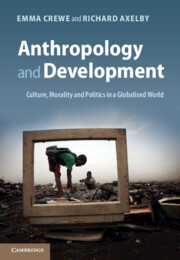Book contents
- Frontmatter
- Contents
- List of acronyms
- Preface and acknowledgements
- 1 Introduction
- 2 Anthropologists engaged
- 3 The social and political organisation of aid and development
- 4 The elusive poor
- 5 Human rights and cultural fantasies
- 6 Hierarchies of knowledge
- 7 The moralities of production and exchange
- 8 The politics of policy and practice
- 9 Imagining the future
- Appendix: challenging questions arising from this book
- Notes
- References
- Index
8 - The politics of policy and practice
Published online by Cambridge University Press: 05 November 2012
- Frontmatter
- Contents
- List of acronyms
- Preface and acknowledgements
- 1 Introduction
- 2 Anthropologists engaged
- 3 The social and political organisation of aid and development
- 4 The elusive poor
- 5 Human rights and cultural fantasies
- 6 Hierarchies of knowledge
- 7 The moralities of production and exchange
- 8 The politics of policy and practice
- 9 Imagining the future
- Appendix: challenging questions arising from this book
- Notes
- References
- Index
Summary
Key points covered by this chapter
Delving beneath the surface of Development World, this chapter looks at various ways that socio-political relations are created by development ideas, policies, rules and encounters.
The main ordering processes are: the creation of rules and policies; simplification and measurement to tame the unruly; mechanisms of separation and exclusion; and temporal and spatial displacement.
While ordering processes suggest convergence, they are often contradictory, contested and transformed within different sites. Divergence and convergence coexist.
We make the case for going beyond ‘power functionalism’, whereby all action is seen as either a strategy to consolidate or resist power, and stress both the importance of understanding specific social relations but also the moral aspects of politics.
Anthropology often starts with the views of the people involved in a particular world. Applied to the world of aid and development, anthropologists have worked to understand the perspectives of farmers, traders, slum dwellers, nomadic-pastoralists, street children, migrants, the poor, marginalised and excluded. Increasingly, they have also tried to understand the culture of development professionals. But to do so is harder than it sounds for a number of reasons. First of all, these groups, and individuals within them, hold highly divergent views of the world; even individuals express endless contradictions, and ambivalent or ambiguous perspectives. Secondly, people’s articulation of their views cannot be read as a mirror of their reality, because what they say can be spoken through a filter of self-publicity, wishful thinking or politeness. Thirdly, what people say they do or think is usually completely different from what they actually do, as anthropologists find out through observation. So to get beneath the surface appearances of social life, anthropologists have to interpret and make sense of multiple perspectives, often trying to look at the way people organise themselves from a more detached, and sometimes lateral, or analogous angle. In this and the next chapter we take a step further away from (or underneath) the emic perspectives (see Chapter 4) on development ideas and practices and explore them through a different lens.
- Type
- Chapter
- Information
- Anthropology and DevelopmentCulture, Morality and Politics in a Globalised World, pp. 183 - 212Publisher: Cambridge University PressPrint publication year: 2012



